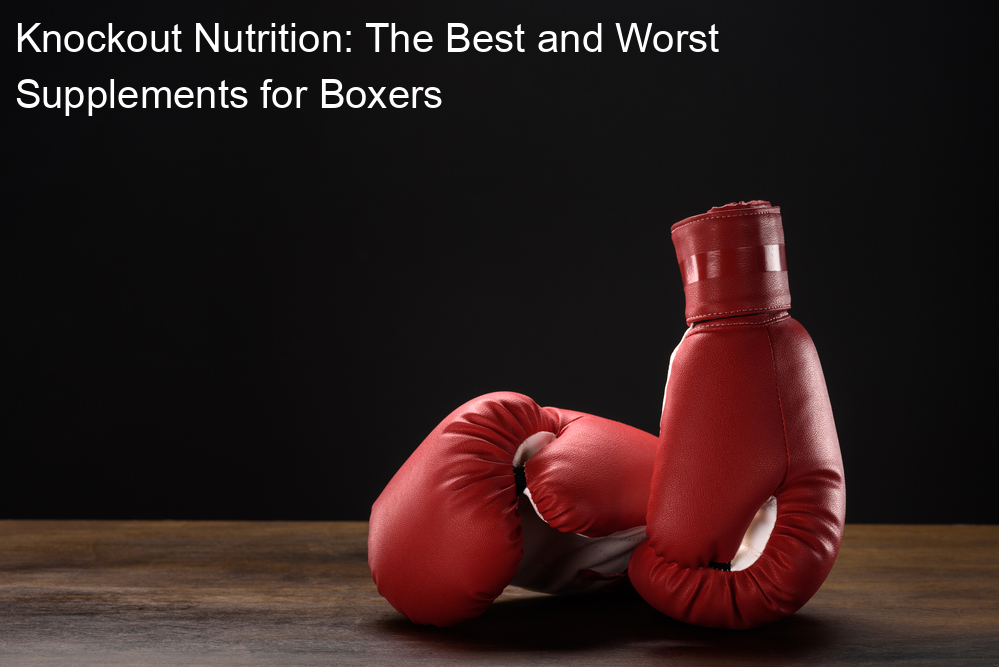
Introduction to Boxing Nutrition Supplements
Boxing is a physically demanding sport that requires strength, speed, and endurance. To perform at their best, boxers need to fuel their bodies with the right nutrients. This is where boxing nutrition supplements come into play. These supplements are designed to provide boxers with the essential nutrients they need to enhance their performance and recovery.
- The Importance of Nutrition for Boxers
- Overview of Common Supplements for Boxers
- Protein Supplements: Protein is essential for muscle growth and repair. Boxers often take protein supplements to help their muscles recover after intense training sessions.
- Creatine: This supplement helps to increase strength and power, which are crucial for boxers.
- Omega-3 Fatty Acids: These are essential for heart health and inflammation reduction, helping boxers to recover faster.
- Vitamins and Minerals: Vitamins like B, C, and E, along with minerals like zinc and iron, are essential for energy production and immune function.
Nutrition plays a crucial role in a boxer’s performance and recovery. A well-balanced diet provides the energy needed for intensive training and helps in quick recovery after a match. However, it can be challenging to get all the necessary nutrients from food alone, especially when training intensively. This is where supplements come in. They help to fill the nutritional gaps, ensuring that boxers get all the nutrients they need to stay in top shape.
There are several supplements commonly used by boxers to enhance their performance and recovery. These include:
It’s important to note that while these supplements can help, they are not a substitute for a balanced diet. Boxers should always strive to get most of their nutrients from whole foods and use supplements as a way to fill in any nutritional gaps.
Best Dietary Supplements for Boxers
Boxing is a physically demanding sport that requires strength, speed, and endurance. To perform at their best, boxers need to fuel their bodies with the right nutrients. One of the most important dietary supplements for boxers is protein.
Protein Supplements
Protein is a crucial nutrient for all athletes, but it’s especially important for boxers. Let’s explore why protein is so beneficial and look at some examples of high-quality protein supplements.
- Benefits of Protein for Muscle Recovery and Growth
- Examples of High-Quality Protein Supplements
Protein is the building block of muscles. After a tough training session, your muscles need protein to repair and grow. Consuming a protein supplement after a workout can speed up this process and help you build stronger muscles. Protein also helps to reduce muscle soreness and improve strength, which are both vital for boxers.
There are many protein supplements on the market, but not all are created equal. When choosing a protein supplement, look for one that is high in protein, low in sugar, and free from unnecessary additives. Some popular choices among athletes include whey protein, casein protein, and plant-based protein powders.
Remember, while protein supplements can be beneficial, they should not replace a balanced diet. Always aim to get most of your protein from whole foods like lean meats, fish, eggs, and dairy products. Supplements are just that – a way to supplement your diet, not replace it.
Now that we’ve covered protein supplements, let’s move on to other important dietary supplements for boxers, such as vitamins and minerals.
Vitamin and Mineral Supplements
Just like the rest of us, boxers need vitamins and minerals to stay healthy. But for them, these nutrients are even more critical. They help in muscle recovery, energy production, and overall performance. Let’s delve into the importance of vitamins and minerals in a boxer’s diet and some recommended supplements.
- Importance of Vitamins and Minerals in a Boxer’s Diet
- Recommended Vitamin and Mineral Supplements for Boxers
Vitamins and minerals play a vital role in a boxer’s diet. They are essential for various body functions such as energy production, bone health, immune function, and muscle recovery. For instance, vitamins like B-complex are crucial for converting food into energy. Minerals like calcium and magnesium are necessary for bone health and muscle function. A deficiency in any of these nutrients can lead to decreased performance and increased risk of injury.
While a balanced diet can provide most of the necessary vitamins and minerals, boxers may need to supplement their diet to meet their increased nutritional needs. Here are some recommended supplements:
| Supplement | Benefits |
|---|---|
| Vitamin B Complex | Helps in energy production and reduces fatigue. |
| Vitamin C | Boosts the immune system and aids in tissue repair. |
| Vitamin D | Supports bone health and muscle function. |
| Calcium | Essential for bone health and muscle contraction. |
| Magnesium | Helps in muscle function and energy production. |
Remember, it’s always best to consult with a healthcare professional or a nutritionist before starting any supplement regimen.
Performance Enhancing Supplements for Boxers
Boxing is a sport that demands a lot from its athletes. To perform at their best, boxers need to supplement their diet with certain nutrients. These performance-enhancing supplements can help boxers increase their power, improve their endurance, and aid in muscle recovery and growth. Let’s take a closer look at these supplements.
- Creatine for increased power and performance
- Beta-Alanine for improved endurance
- BCAAs for muscle recovery and growth
Creatine is a substance that is naturally found in muscle cells. It helps your muscles produce energy during heavy lifting or high-intensity exercise. Supplementing with creatine can lead to significant increases in muscle mass, strength, and exercise performance. It can also help reduce fatigue and tiredness.
Beta-Alanine is a non-essential amino acid. It is used by muscle cells to produce carnosine, a molecule that helps buffer acid in muscles, increasing physical performance in the 60–240-second range. Beta-Alanine can help improve performance and benefit overall health. It’s especially effective in high-intensity interval training.
BCAAs, or Branched-Chain Amino Acids, are a group of three essential amino acids: leucine, isoleucine, and valine. They are essential, meaning they can’t be produced by your body and must be obtained from food. BCAAs are crucial for muscle growth and recovery. They also reduce muscle soreness and provide the body with energy during workouts.
In conclusion, these supplements can give boxers the extra edge they need to succeed in their training and matches. However, it’s important to remember that supplements should not replace a balanced diet. Always consult with a healthcare professional before starting any new supplement regimen.
| Supplement | Benefits |
|---|---|
| Creatine | Increases power and performance, reduces fatigue |
| Beta-Alanine | Improves endurance, especially in high-intensity training |
| BCAAs | Supports muscle recovery and growth, reduces soreness |
What Supplements Should Boxers Take?
Boxing is a physically demanding sport that requires optimal nutrition for peak performance. In addition to a balanced diet, certain supplements can provide essential nutrients that boxers need for their rigorous training and recovery. Let’s explore some of these beneficial supplements.
Natural Supplements for Boxers
Natural supplements are a great way to boost a boxer’s health and performance. They are derived from food sources and have minimal side effects. Here are a couple of natural supplements that are beneficial for boxers:
- Omega-3 Fatty Acids: Omega-3 fatty acids are essential fats that the body cannot produce on its own. They are crucial for brain health, helping improve focus and cognitive function. Additionally, they have anti-inflammatory properties that can help reduce muscle inflammation, promoting faster recovery after intense workouts. Foods rich in Omega-3 include fish, flaxseeds, and walnuts. However, it can be challenging to get the required amount from diet alone, making supplementation a good option.
- Green Tea Extract: Green tea extract is another excellent supplement for boxers. It is known for its fat-burning properties, which can help boxers maintain a healthy weight. Additionally, it is packed with antioxidants that protect the body from damage by harmful molecules called free radicals. Regular consumption of green tea extract can thus help improve overall health and boost performance.
Remember, while these supplements can enhance performance and recovery, they should not replace a balanced diet. Always consult with a healthcare professional or a nutritionist before starting any new supplement regimen.
Supplements to Avoid for Boxers
While many supplements can be beneficial to boxers, there are also those that should be avoided. Some supplements can be harmful to the body and can negatively affect a boxer’s performance and overall health. It’s important to know which ones to steer clear of.
- Why some supplements can be harmful
- Examples of supplements to avoid
Not all supplements are created equal. Some contain ingredients that can be harmful to the body. For instance, some supplements may contain high levels of caffeine, which can lead to dehydration, insomnia, and increased heart rate. Other supplements may contain banned substances that can lead to disqualification in competitions. Furthermore, some supplements are not regulated by the Food and Drug Administration (FDA), meaning their safety and effectiveness are not guaranteed.
Boxers should be wary of supplements that promise quick and drastic results. These often contain harmful ingredients. Here are a few examples:
| Supplement | Reason to Avoid |
|---|---|
| Weight loss pills | These often contain high levels of caffeine and other stimulants, which can lead to dehydration and other health issues. |
| Prohormones | These are precursors to hormones and can have serious side effects, including liver damage and increased risk of heart disease. |
| Unregulated pre-workout supplements | These can contain a variety of ingredients, some of which may be harmful or banned in competitions. |
Remember, it’s always best to consult with a healthcare professional or a nutritionist before starting any new supplement regimen. They can provide guidance on what supplements are safe and beneficial for your specific needs and goals.
Boxing Diet and Supplements
Boxing is a physically demanding sport that requires a well-balanced diet and the right supplements to maintain optimal performance. In this section, we will discuss the importance of meal timing and composition in a boxer’s diet.
Meal Timing and Composition
Meal timing and composition play a crucial role in a boxer’s diet. Let’s delve deeper into these aspects.
- Importance of Meal Timing for Optimal Performance
- Examples of Ideal Meal Compositions for Boxers
Meal timing is a key factor in a boxer’s diet. It’s not just about what you eat, but also when you eat. Consuming meals at the right times can help maintain energy levels, improve recovery, and enhance performance.
Eating a balanced meal 2-3 hours before training provides the body with the necessary fuel for intense workouts. Post-workout meals, ideally consumed within 30 minutes to 2 hours after training, are crucial for muscle recovery and replenishment of energy stores.
A boxer’s meal should be balanced and nutritious, containing the right mix of carbohydrates, proteins, and fats. Here are some examples of ideal meal compositions for boxers:
| Meal | Food Items |
|---|---|
| Pre-Workout Meal | Whole grain bread, lean protein (like chicken or turkey), and a piece of fruit |
| Post-Workout Meal | Protein shake, banana, and a handful of nuts |
| Dinner | Grilled fish, brown rice, and steamed vegetables |
Remember, every boxer is unique and may have different dietary needs. It’s important to consult with a nutritionist or dietitian to create a meal plan that suits individual requirements and goals.
Hydration and Electrolytes
Hydration and electrolytes are essential components in a boxer’s diet. They play a crucial role in maintaining the body’s balance and ensuring optimal performance during training and matches.
- Importance of hydration for boxers
Hydration is vital for boxers. It helps to regulate body temperature, lubricate joints, and transport nutrients throughout the body. When a boxer is dehydrated, their performance can significantly decrease. They may experience fatigue, muscle cramps, and dizziness, which can affect their ability to fight effectively.
A study by the American College of Sports Medicine found that even a 2% decrease in body water can impact a boxer’s performance. Therefore, it’s crucial for boxers to stay hydrated before, during, and after their training or matches.
- Recommended electrolyte supplements
Electrolytes are minerals that help maintain the body’s ionic balance. This balance is essential for muscle function, pH balance, and fluid regulation. When boxers sweat, they lose electrolytes, mainly sodium and potassium. These losses can lead to muscle cramps, fatigue, and irregular heartbeat.
Boxers can replenish their electrolytes through supplements. Some recommended electrolyte supplements include:
| Supplement | Benefits |
|---|---|
| Potassium | Helps with muscle contractions and nerve signals |
| Sodium | Regulates fluid balance and prevents cramping |
| Magnesium | Supports muscle and nerve function, and energy production |
| Calcium | Needed for muscle function and bone health |
It’s important to note that while supplements can help, the best source of electrolytes is a balanced diet. Boxers should aim to eat a variety of foods rich in these minerals to meet their needs.
Conclusion: Nutrition for Boxers
As we wrap up our discussion on boxing nutrition, let’s take a moment to revisit some of the key points we’ve covered. Nutrition is not just about eating; it’s about fueling your body for optimal performance. For boxers, this means choosing the right dietary supplements and understanding how they can impact your training and performance.
- Recap of the best and worst supplements for boxers
- Final thoughts on the importance of nutrition for boxers
Throughout our discussion, we’ve highlighted several supplements that can be beneficial for boxers. These include protein for muscle repair and growth, creatine for energy production, and omega-3 fatty acids for inflammation reduction and cardiovascular health. On the other hand, we’ve also pointed out some supplements that may not be as beneficial, such as those containing excessive amounts of caffeine or artificial additives. It’s crucial to remember that not all supplements are created equal, and it’s essential to choose those that align with your specific needs and goals.
Nutrition plays a pivotal role in a boxer’s performance. It’s not just about the physical training; it’s also about what you put into your body. Proper nutrition can enhance your energy levels, improve your recovery time, and help you maintain a healthy weight. Conversely, poor nutrition can hinder your performance and potentially lead to health issues. Therefore, it’s crucial to take your nutrition seriously and make informed decisions about your diet and supplement intake.
In conclusion, remember that nutrition for boxers is a complex and individualized process. It’s not a one-size-fits-all approach, and what works for one person may not work for another. Always consult with a healthcare professional or a nutritionist before starting any new supplement regimen. And remember, the best supplement is a balanced, nutritious diet.






